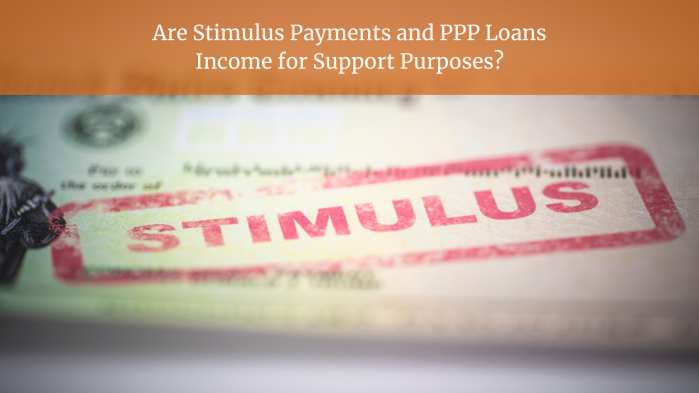With the pandemic, a new source of revenue has been found for parents and businesses. Each stimulus package passed by Congress has come with stimulus payments made to individuals making less than a certain threshold, with payments not only for the parent but also for any qualifying child. Similarly, businesses have been permitted to borrow funds in the form of a forgivable loan, which loan is forgiven if you used the funds for payroll and other approved purposes. In both circumstances, and provided a person qualifies for the funds, the court must consider whether these funds are income when determining child support or spousal support.
Since March 2021 when COVID-19 first caused people to work from home, Congress has passed three separate stimulus bills, all of which required certain payments to be made to individuals earning less than a certain cap. In April 2020, those qualifying individuals received $1,200 in tax-free payments. In addition to the individual payments, payments of the same amounts were made per qualifying child. So, a family of 4 had potential to receive $4,800 in tax-free stimulus payments. Similar legislation resulted in payments of $600 per qualifying adult or child in December 2020 and $1,400 per qualifying individual in March 2021.
In terms of the payments for qualifying children, those payments were made to the party who claimed the qualifying child for tax purposes based on the last tax filing. In most circumstances, it played out like this: (1) whoever claimed the child in 2019 received the 2020 payments of $1,800; and (2) whoever claimed the child in 2020 received the 2021 payments (unless the return was not filed by a certain date).
The issues that arises in the context of support is whether these payments are income for support purposes. By statute, income for support purposes includes “…other entitlements to money or lump sum awards…”. Pa.R.C.P. 191016.-2(a)(8); 23 Pa.C.S. Section 4302. At first blush, it appears that these payments would fall in this category. A recent case addressing this issue has caused practitioners to pause.
In Amos v. Rivera, Judge Lash in Berks County rules that stimulus payments are not income for support purposes. 113 Berks 107 (Dec. 16, 2020). The Domestic Relations Office argued that the payments were income as they were permitted to be intercepted for child support collection much like a tax refund. The Court, however, did not find that argument persuasive and instead noted that the purpose of the payment was akin to public assistance as the payment was made to provide economic assistance to people who were experiencing cash flow shortages due to the pandemic. Judge Lash noted that the definition of income specifically excludes public assistance. As a result, the matter was remanded to Domestic Relations to adjust the support.
This is the first and only published opinion in Pennsylvania on this issue, although it not binding authority as it was entered by a trial court and not an appellate court. Moreover, it truly is hard to fathom a situation where these payments actually have an impact on the overall support calculation.
Conversely, the receipt of a large loan that is forgiven may have a substantial impact on the income of a party to a support proceeding. As part of the stimulus bills, Congress permitted businesses to borrow funds to maintain payroll and other expenses. Those loans could be as small as a few thousand dollars or a much as multiple millions of dollars. This benefit only applies to parties to a support proceeding who have an interest in a business, be it a sole proprietorship, an S Corporation or a C Corporation. So far, there have been no reported decisions in Pennsylvania as to whether the receipt of these funds (and subsequent forgiveness) are income when determining an appropriate child or spousal support order. It is clear that any portion of the loan which was repaid is not income as loans cannot be considered to be income for support purposes. Fitzgerald v. Kempf, 805 A.2d 529 (Pa.Super. 2002).
The PPP loan monies are received by a business and deposited into the business banking account for use as permitted in the stimulus bill. In this respect, the receipt of these funds would be no different than general revenue. The funds are then used to fund payroll and other qualifying business expenses. What is left after the payment of business expenses is cash flow and we are all aware that cash flow is what is utilized when determining a business owner’s support obligation. Fennell v. Fennell, 753 A.2d 866 (Pa.Super. 2000); see also Hoag v. Hoag, 646 A.2d 578 (Pa.Super. 1994); King v. King, 568 A.2d 226 (Pa.Super. 1989).
More importantly, it appears that these loans which are forgiven fall clearly within the definition of income under the Support statute as that definition specifically states that income includes “income derived from a business” and “income from discharge of indebtedness.” 23 Pa.C.S.A. Section 4302. In any event, we must wait for a later date for some direction from our courts on this issue.

